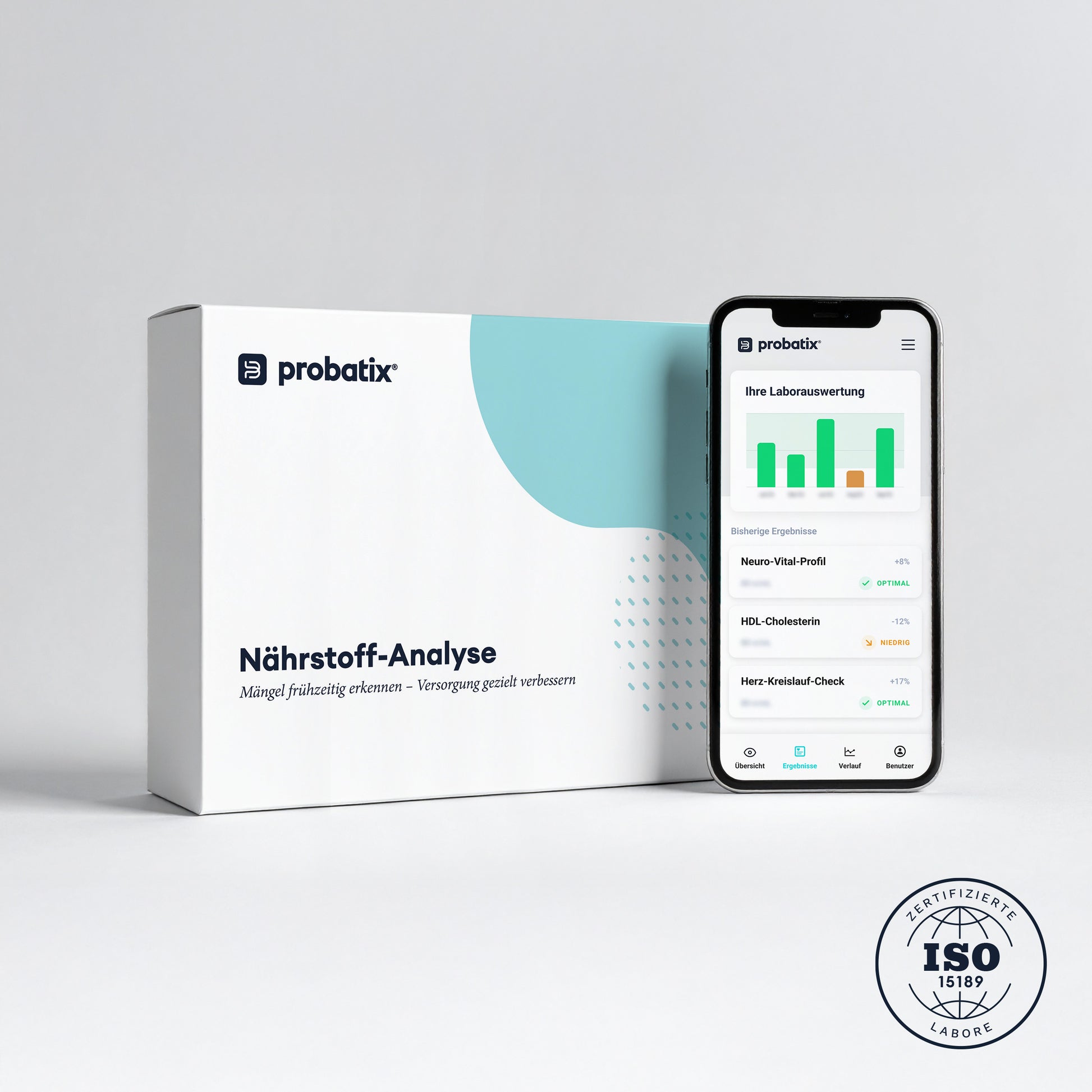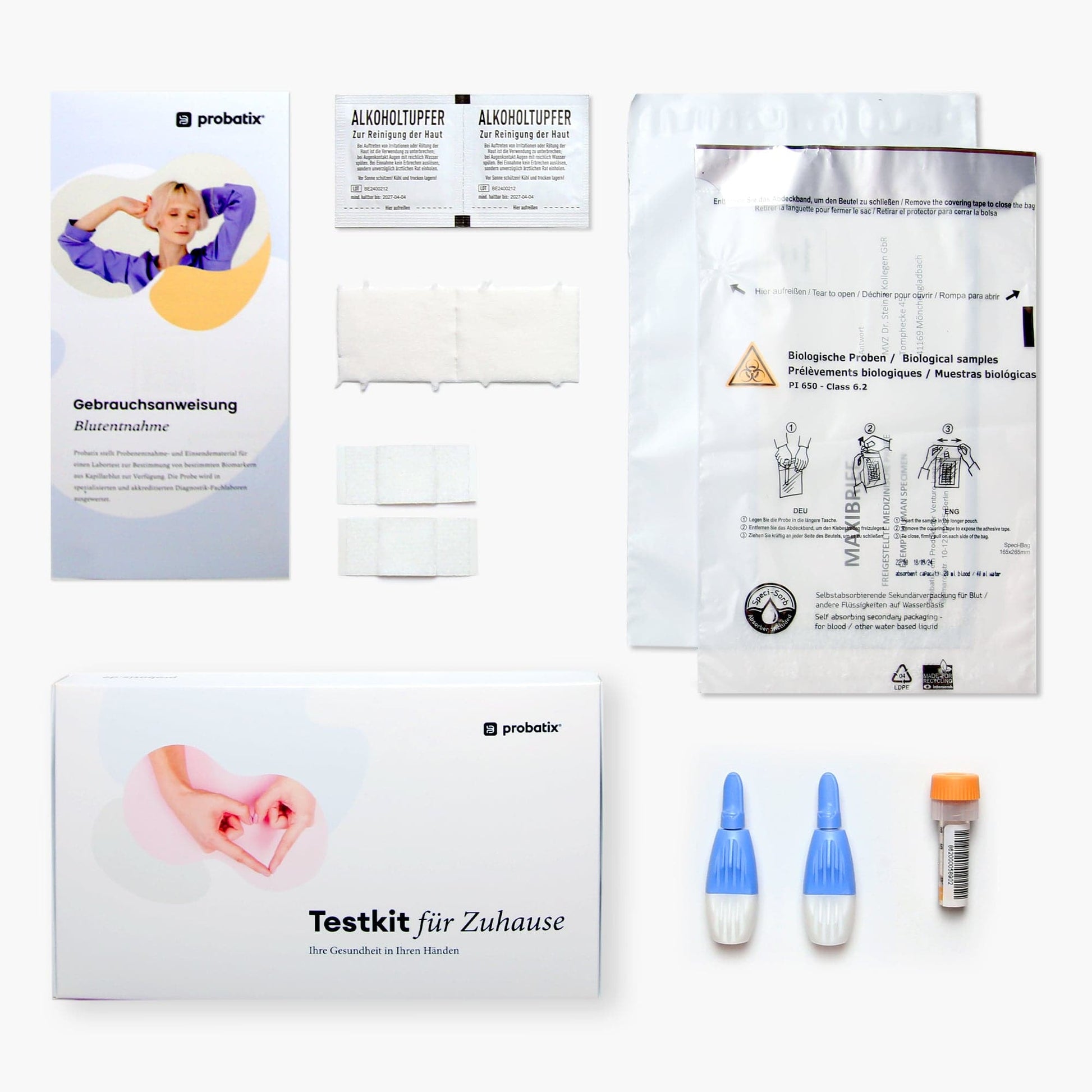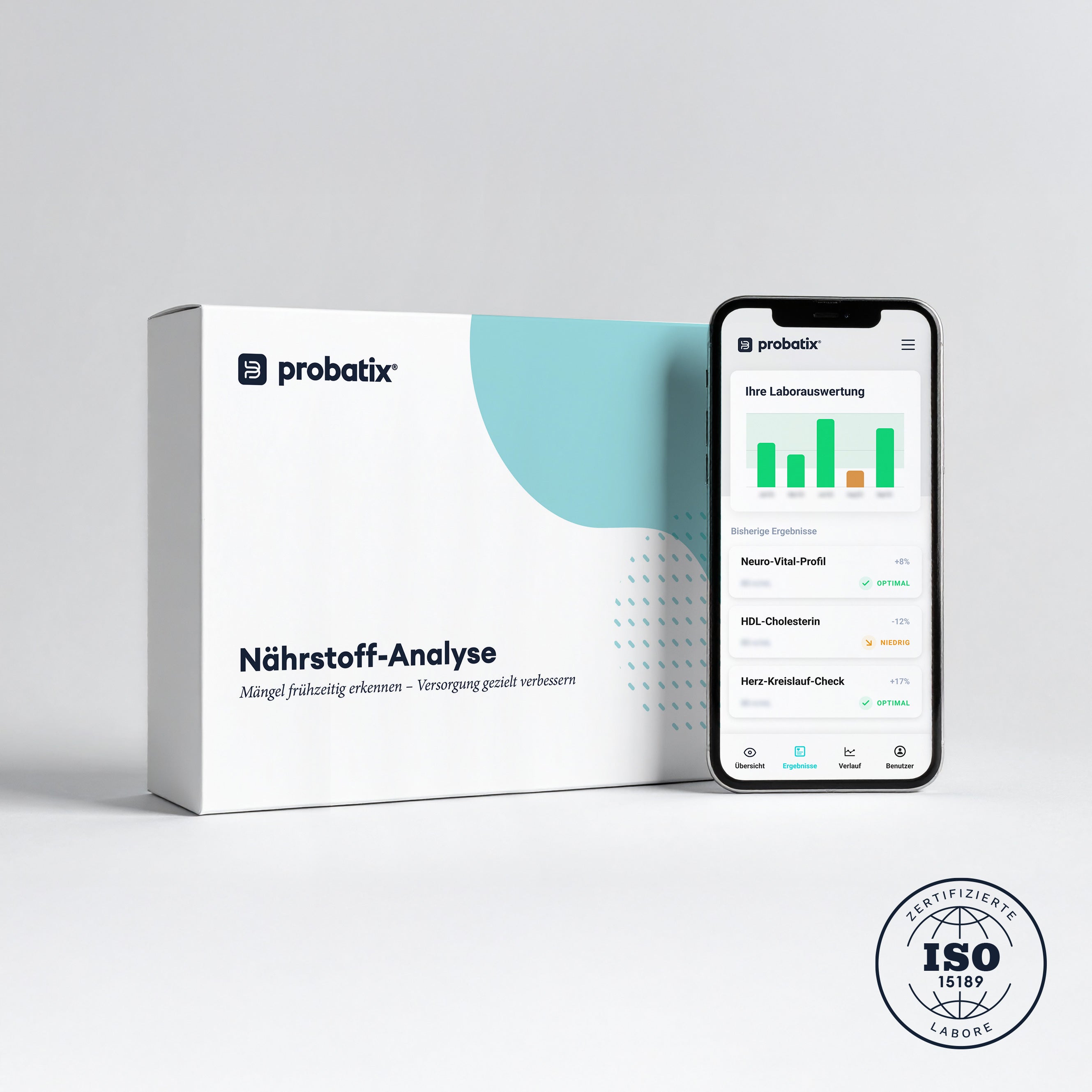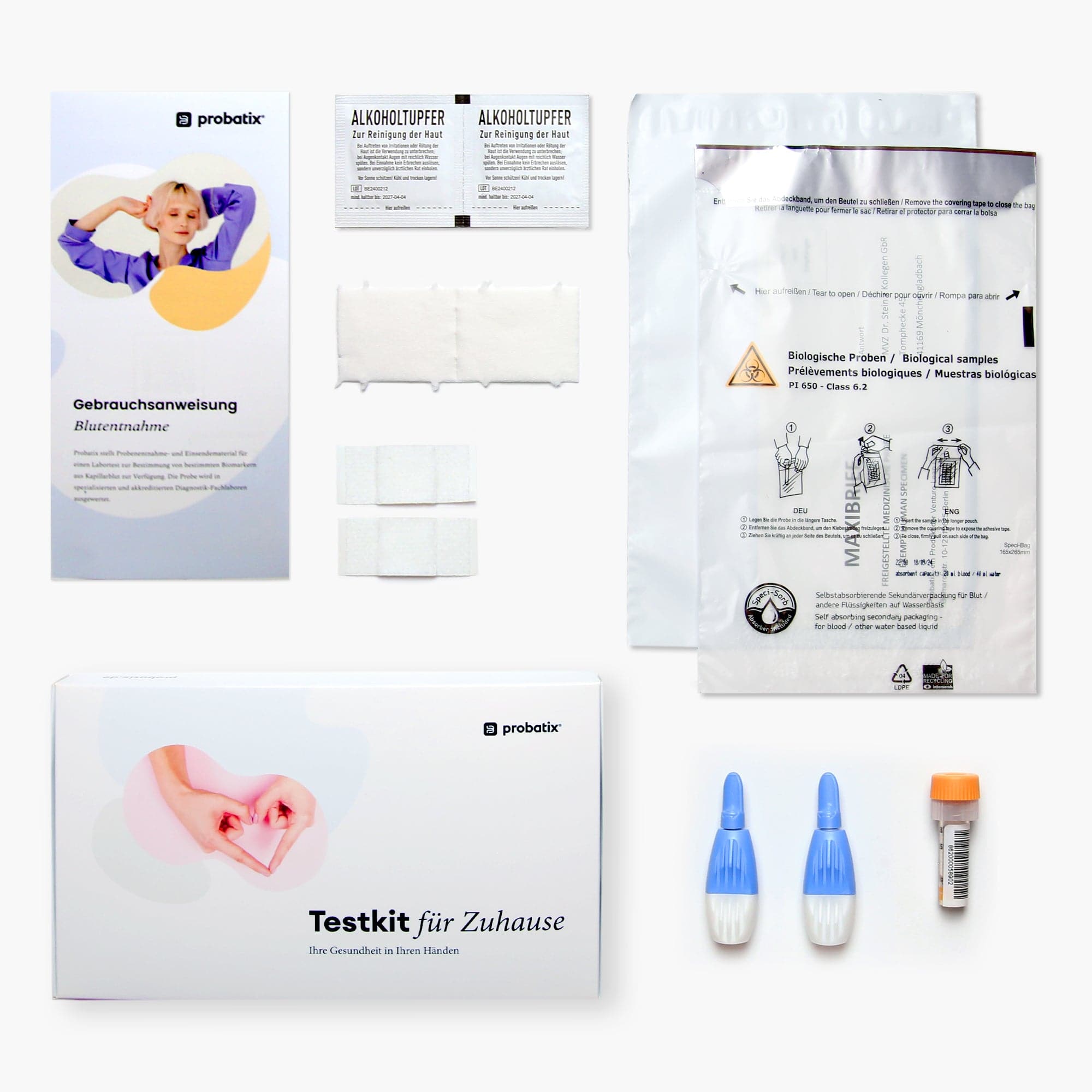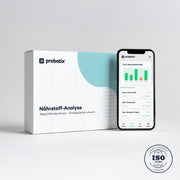Nutrient Analysis
Nutrient Analysis
Keep track of your nutrient supply – for more energy and performance.
- Comprehensive analysis: Measurement of key nutrients and markers such as Vitamin D, Vitamin B12, Ferritin, Transferrin, Calcium, Sodium, and Albumin.
- Early detection: Identifies deficiencies before they affect your health and well-being.
- Simple & flexible: Sampling conveniently from home with professional lab evaluation.
This way, you can detect early on what your body is missing – and what it needs.
Tip: An even more comprehensive picture of your nutrient levels is offered by our Nutrient Analysis Plus.
In Stock
What values does this test measure?
What values does this test measure?
Further information on the values can be found here.
How does it work?
How does it work?
1. Take a sample with our test kit
2. Send the sample to the lab using the prepaid envelope
3. View results digitally after a few days
Why are the values reliable?
Why are the values reliable?
All tests offered by us are evaluated and validated in certified medical laboratories in Germany.
This is what the press says about our tests
Nutrient Analysis: All details about the test
What benefits does this test offer me?
What benefits does this test offer me?
An overview of the most important nutrients for your health.
The Nutrient Analysis examines key markers of your nutrient supply through a blood test: (25-OH-)Vitamin D, Vitamin B12 (Cobalamin), Ferritin, Transferrin, Calcium, Sodium, and Albumin. With this detailed analysis, you receive a precise picture of your supply status and can identify potential deficiencies early.
Why test now? A balanced nutrient balance is crucial for energy, performance, and well-being. With the Nutrient Analysis, you can detect deficiencies in time before they affect your health.
Your benefits:
- Comprehensive results: Analysis of the most important vitamins, minerals, and proteins.
- Simple and convenient: Sample collection flexibly from home.
- Clear Feedback: Your individual report shows your values compared to the reference ranges.
Ensure your optimal supply – with the Nutrient Analysis from Probatix.
What do the measured values mean?
What do the measured values mean?
25-OH vitamin D is the storage form of vitamin D that the body produces in the liver from vitamin D formed with sunlight or food. Vitamin D supports calcium absorption, ensures healthy bones and teeth, and plays an important role for muscles, nerves, and the immune system.
The 25-OH vitamin D test is the best method to check vitamin D status. Low levels can indicate too little sunlight, an unbalanced diet, or diseases and are associated with bone diseases such as osteoporosis or rickets. Excessive levels usually result from too high supplement doses and can strain the kidneys and liver.
Albumin
Albumin is the most common protein in blood plasma and is produced in the liver. It retains fluid in the vascular system and transports vitamins, enzymes, and hormones.
A deficiency may be caused by liver or kidney diseases, inflammation, or poor protein supply. High albumin levels occur with fluid loss or a very high-protein diet. Since albumin also reflects the nutritional situation, persistently low levels indicate insufficient protein intake and an increased risk of muscle weakness or infections.
Ferritin
Ferritin is a protein that stores iron in the body and releases it when needed. The ferritin level in the blood indicates how well the body's iron stores are filled and is therefore often used to assess iron status.
Low values usually indicate an iron deficiency or anemia. Elevated values may suggest inflammation, liver diseases, or iron overload.
Calcium
Calcium is an essential mineral primarily stored in bones and teeth. It ensures the stability of the skeleton and plays an important role in muscle function, blood clotting, and nerve signal transmission. A blood test measures the portion circulating in the blood.
Too low calcium levels can cause muscle cramps, tingling, or heart rhythm disturbances. Too high levels often indicate disorders of the parathyroid gland, certain tumors, or excessive intake of vitamin D.
Sodium
Sodium is an important mineral and electrolyte that regulates the body's water and salt balance. It also plays a central role in nerve signal transmission and muscle function. The body usually maintains sodium levels within a narrow range to keep essential functions stable.
Excessive levels (hypernatremia) often occur with fluid deficiency and can trigger thirst, confusion, or seizures. Low levels (hyponatremia) can result from significant fluid loss, kidney problems, or certain medications, leading to weakness, headaches, and, in extreme cases, consciousness disorders.
Transferrin
Transferrin is a protein produced in the liver that transports iron in the blood. It ensures that iron reaches the organs and bone marrow, where it is needed for blood formation.
High transferrin levels often indicate an iron deficiency, as the body produces more transport protein when there is little iron available. Low levels can occur in chronic inflammation, liver diseases, or malnutrition.
Vitamin B12
Vitamin B12 is an essential vitamin required for the formation of red blood cells, the functioning of the nervous system, and the production of DNA. It is found almost exclusively in animal foods such as meat, fish, eggs, and dairy products.
A deficiency in Vitamin B12 can lead to anemia, fatigue, concentration problems, and nerve damage. Those at increased risk for a deficiency include primarily older people, vegetarians, vegans, or individuals with absorption disorders in the intestine.
Why is this test important?
Why is this test important?
The nutrient analysis is crucial for a comprehensive review of your nutrient supply and helps ensure that your body functions optimally.
- Fluid and electrolyte regulation: Measurement of sodium and albumin – important for nerve, heart, and muscle function.
- Bone and muscle health: Analysis of calcium and vitamin D – supports stable bones, teeth, and muscles.
- Energy and vitality: Review of ferritin, transferrin, and vitamin B12 – relevant for iron storage, blood formation, and cell division.
When should I take this test?
When should I take this test?
The nutrient analysis can be useful for the following symptoms or signs:
- If you are constantly tired or exhausted
- Concentration problems or mental performance weakness
- Muscle weakness or muscle cramps
- Pale skin, brittle nails, or hair loss
- Frequent infections or a weak immune system
- General weakness, exhaustion, or malaise
- Unbalanced diet or suspected nutrient deficiency
Important: Discuss your results with a doctor to clarify the causes and initiate appropriate measures.
What is included in the test kit?
What is included in the test kit?
Where can I find the instructions?
Where can I find the instructions?
Bei Fragen hilft Ihnen auch immer gerne unser wunderbarer Support weiter: support@probatix.de
FAQ - More Frequently Asked Questions about the Test
FAQ - More Frequently Asked Questions about the Test
1. What is tested in the nutrient analysis?
The nutrient analysis examines key blood values that provide information about your supply of vitamins, minerals, and proteins. These include Vitamin D, Vitamin B12, Ferritin, Transferrin, Calcium, Sodium, and Albumin.
2. Who is the nutrient analysis suitable for?
The test is ideal for people who want to keep an eye on their energy, performance, and overall health – especially if experiencing symptoms like fatigue, concentration problems, or frequent exhaustion.
3. Why are these values important?
Vitamin D and Calcium are crucial for bones and muscles, Vitamin B12 and iron levels (Ferritin, Transferrin) for blood formation and energy, while Sodium and Albumin are important for fluid balance, nerve, and muscle function.
4.How is the nutrient analysis conducted?
The process is simple: You take a small blood sample from your fingertip at home and send it to our certified specialist laboratory, where your values are professionally analyzed.
5. How long does it take to receive my results?
Your results are usually available within a few days in your personal Probatix dashboard.
6. What do the results indicate?
The results show whether your nutrient levels are within the normal range or if there are deficiencies that could explain fatigue, exhaustion, or performance loss.
7. What can I do if the results are abnormal?
If the values are abnormal, you should discuss the results with a doctor or nutritionist. This way, targeted measures such as dietary adjustments, supplements, or further examinations can be initiated.
8.How does the nutrient analysis help me with health prevention?
The analysis allows you to identify and prevent deficiencies in a timely manner – before symptoms affect your health and performance.
9. Can the nutrient analysis also be used preventively?
Yes, the test is a sensible preventive measure to regularly check your own supply and take early countermeasures.
10. How often should I have my nutrient levels checked?
It is recommended to conduct the nutrient analysis regularly – especially if there are risk factors such as an unbalanced diet, intensive physical activity, or existing health issues.
11.Is the nutrient analysis also suitable for athletes?
Yes, athletes in particular benefit from a precise knowledge of their nutrient values, as optimal supply is crucial for performance, recovery, and muscle building.
Das sagen unsere Kunden
Your benefits for your health
Test with minimal effort
Understanding Your Own Health
Recognize changes early
